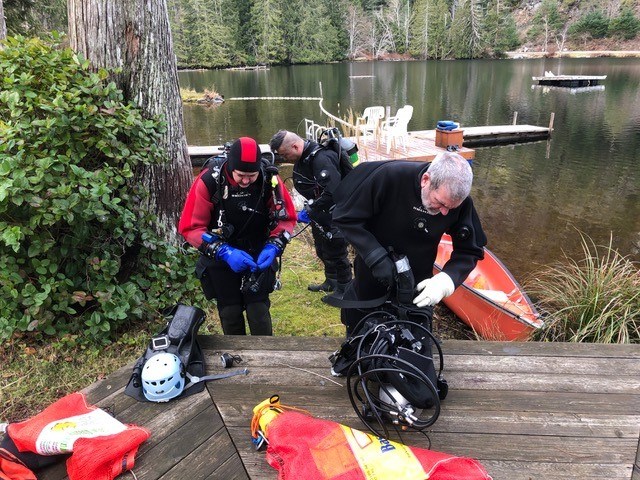Beer bottles, red solo cups and a party hat. It sounds like the makings of a fun time, but these are just a few of the items volunteer divers recently found at the bottom of Hotel Lake in Pender Harbour.
In February, Brian Croft invited volunteers from Divers for Cleaner Lakes and Oceans (DFCLO) to explore the bottom of the lake, where his family has owned a cabin for 20 years across from the lake’s popular rope swing. A few years ago, Croft lowered a GoPro camera about 16 feet into the lake and while he could see a lot of junk, he wasn’t able to extract it himself.
Over two days, three volunteers pulled out more than 70 pounds of trash from Hotel Lake. Their haul included a plastic lawn chair and a tire, and many cans and bottles. Two more tires couldn’t be retrieved when the disturbed sediment clouded visibility. Other items, like scuttle boats, were too heavy to resurface.
“I only found a few things, but I suspect that a lot more in there. I just can't see it,” Henry Wang, one of the divers and the group’s videographer, told Coast Reporter.
He said it was their first time checking out a lake on the lower Sunshine Coast, but they’re open to doing more. Wang is based in North Vancouver and has cleaned lakes in the Sea to Sky area, Mermaid Cove of Saltery Bay Provincial Park as well as Bowen Island – wherever he gets the call. The volunteers’ website cleanerlakes.com estimates they’ve removed 45,945 pounds of garbage over the course of 182 clean-up dives since 2013.
Hotel Lake is a small, relatively shallow lake. According to the Hotel Lake Advisory’s website, it measures at about 1.1 kilometres long and has a maximum depth of around 10 metres (33 feet). It also acts as a water source for lakeside residents and the Hotel Lake Campground, and is a home to wildlife. Before diving, Croft said the divers made sure they were aware of sensitive areas, such as where the painted turtles hibernate.
It was four degrees Celcius in the lake when the divers submerged. Along with trash, Croft said the divers brought back observations. One of the challenges of Hotel Lake is the sediment that covers the bottom.
“It's a very specific kind of silt,” Wang said. “Whatever lands on it goes right through the silt because it's incapable of holding up an object. So unless something landed fairly recently, or something has to land in the silt in a specific way… I wouldn't be able to see it.”
The diver said Hotel Lake was not nearly as polluted as he thought it would be, but there’s no way of finding what else may be buried at the bottom.
“I don't think it's even possible to clean the lake,” Croft said. “I think we just have to stop putting more in.”
The amount of trash pulled from Hotel Lake is not as bad as Squamish’s Cat Lake or Cultus Lake in the Fraser Valley, Wang said. The volunteer divers have to return to those sites on a regular basis because of their “extreme use.”
“Places like Cat Lake, it's a repetitive cycle. We know how much we can get out in a single year because the trash is replenished every single year. Now, that's not to say if we do this enough times and educate the public enough, that it won't reduce.”
DFCLO has gotten quite a bit of media coverage in recent years, partly because of the videos Wang shoots of the underwater scenes. Since joining TikTok at the end of 2020, Wang has amassed more than 18,000 followers and 175,000 likes.
“I was tickled pink, I think it's just a real win-win for everybody,” Croft said of the volunteers’ clean-up efforts and video of Hotel Lake. “You know, up to this point, when stuff gets thrown in a lake, as soon as it drops below the surface, that's essentially it. You can't see it, you don't know it's there. And for all intents and purposes, it isn't there. But, of course, it is.”
Wang said he’s not sure what more could be done about the pollution of B.C.’s lakes. Some of the trash winds up in the lake by accident, he says, but some of it is also the result of inconsiderate lake users. Many of the polluted lakes he cleans do have garbage cans, he said.
On an individual basis, Wang said there are several ways to help - and you don’t have to be a diver to make a difference. People can start by cleaning up trash when they see it, whether that’s on a walk in their own neighbourhood or on a trail.
“The reality is that a lot of times whatever it is on the road or pathways, it gets washed into the ocean or lakes. So if you pick it up, that's one less thing that has to be dealt with in the ocean,” he said.
Sharing the message can help, too. DCFLO also accepts donations to help cover the costs associated with clean-ups. Anyone who knows of a lake that sees heavy visitation and pollution can also get in touch with the volunteers about a clean-up dive.
“I just feel that the most important thing is that we continue trying to find real information about what's going on so that we can all make a better decision next time we go to not pick up the dog poop or to throw something in the lake,” Croft said. “It's just one of those things that I think people do without thinking. But if they know the real truth of what's happening to the planet, then maybe they'll change their behavior.
“Just looking at that pile you think, ‘Whoa, what are we doing?’”



